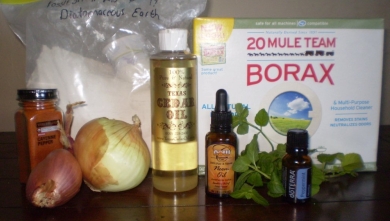Pesticides: Summer Bug Protection
 Summer is breeding time for bugs, which brings increased exposure to mosquitoes, ticks, and various stinging insects. How do we avoid the use of harsh chemicals and still protect our skin and our health?
Summer is breeding time for bugs, which brings increased exposure to mosquitoes, ticks, and various stinging insects. How do we avoid the use of harsh chemicals and still protect our skin and our health?
With proper precaution and preparation, there's no reason you can't enjoy the great outdoors this summer!
Practical Tips
Before we look at applying and spraying, let's consider a few helpful tips for dealing with bugs:
- Do not wear fragrances. Bugs are already drawn to hormones, pheromones, and chemicals released in our sweat. No need to add any extra scents to attract them!
- Eat garlic and drink 1-2 tbsp. apple cider vinegar, as insects are repelled by these.
- Wear plenty of clothing. Keep well covered. Pull socks over pant cuffs. Avoid bright clothing.
- Shower quickly after exposure to bugs, especially ticks.
- When camping, throw sage, rosemary, and/or lemon balm leaves on the fire to reduce bugs.
Bug-Busting Bonanza
Whether invading your kitchen, attacking your garden, or infesting your pets, insects and other uninvited pests are a time-consuming nuisance and may even present a risk to your health. The strong chemicals found in most commercial bug-killers and repellents may further compromise the safety of your environment. So how can you win the war against pests and still keep your family safe? Consider our four R's of natural pest control: Remedies, Recipes, References, and Resources.
Remedies
There are a myriad of natural pest-control options. It's often a trial-and-error process to find the right blend or product for your situation. Listed below are some potential pest remedies.
- Garlic and/or onion and/or cayenne. Liquid sprays can be made with any or all of these to help deter/kill pests inside and outside.
- Cedar is often used as a moth repellent, but is also effective against other pests.
- Diatomaceous earth (DE) consists of fossilized remains of diatoms, a type of hard-shelled algae. DE is effective against insects with an exoskeleton. Be sure to choose food grade.
- Pyrethrum. Pyrethrum powder comes from ground chrysanthemum flowers and contains pyrethrin, a natural pesticide. This is not the same as pyrethroid, which is a synthetic pesticide. (Cats are sensitive to low doses and some may be allergic to pyrethrum.)
Natural Lawn Care
Before looking at the non-chemical pest/weed control options, it's important to address this question: Are weeds necessarily "bad"?
Weeds such as dandelions offer tremendous health benefits, ranking in the top four green vegetables in overall nutritional value. Purslane tops the list of plants with omega-3 fats. Stinging nettle is difficult to handle, but the young leaves offer a multitude of minerals. See this website for a comprehensive list of these wild nutritional boosters.
Even with my "good weeds," how do I care for my lawn without the use of harsh chemicals? There are numerous resources dedicated to helping you provide a safe, attractive addition to your home.

